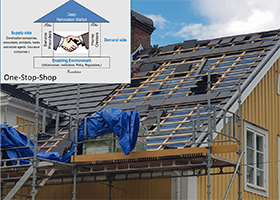Business Models for Energy Renovation of Residential Buildings
A special issue of Energies (ISSN 1996-1073). This special issue belongs to the section "G: Energy and Buildings".
Deadline for manuscript submissions: closed (30 November 2021) | Viewed by 2180

Special Issue Editors
Interests: energy renovation; one-stop shop; business model; business innovation; energy performance contract; district level renovation; household behavior; energy policy; transition management; role of local authorities
Interests: sustainable construction; housing strategies; business models; policy instruments; innovation management; energy efficiency; energy flexibility; circular economy
Special Issue Information
Dear Colleagues,
There is an urgency to address climate change, security of energy supply, energy poverty, and several other aspects of the Global Agenda 2030. Energy efficiency is key to addressing these challenges. Several studies have recognized that the residential building sector has a significant energy efficiency potential. As an example, in Europe, a large share of buildings, built during the 1960s–1980s, are in need of deep renovation. This provides a unique opportunity for cost-effective implementation of energy efficiency measures. However, the rate of energy renovation is inadequate due to several hindrances, which require policy and market interventions. The renovation market is worth €122 billion in Europe and €76 billion in Asia Pacific. To tap into this huge market and realize the long-term energy efficiency potential, there is a need for innovative business models that address the multitude hindrances and make the energy renovation market attractive to homeowners. Several such business models, e.g., the one-stop-shop models, are emerging in different countries. The main goal of this Special Issue is to gather knowledge of and experience in such models, as well as analysis of household behavior, supply-side issues, energy performance contract, district level renovation, role of public authorities, financing aspects, policy perspective, transition management, or any other aspect related to business models. Papers can take the form of either regular research papers or reviews of relevant research.
Prof. Dr. Krushna Mahapatra
Dr. Erwin Mlecnik
Dr. Brijesh Mainali
Guest Editors
Manuscript Submission Information
Manuscripts should be submitted online at www.mdpi.com by registering and logging in to this website. Once you are registered, click here to go to the submission form. Manuscripts can be submitted until the deadline. All submissions that pass pre-check are peer-reviewed. Accepted papers will be published continuously in the journal (as soon as accepted) and will be listed together on the special issue website. Research articles, review articles as well as short communications are invited. For planned papers, a title and short abstract (about 100 words) can be sent to the Editorial Office for announcement on this website.
Submitted manuscripts should not have been published previously, nor be under consideration for publication elsewhere (except conference proceedings papers). All manuscripts are thoroughly refereed through a single-blind peer-review process. A guide for authors and other relevant information for submission of manuscripts is available on the Instructions for Authors page. Energies is an international peer-reviewed open access semimonthly journal published by MDPI.
Please visit the Instructions for Authors page before submitting a manuscript. The Article Processing Charge (APC) for publication in this open access journal is 2600 CHF (Swiss Francs). Submitted papers should be well formatted and use good English. Authors may use MDPI's English editing service prior to publication or during author revisions.
Keywords
- Energy renovation
- Energy efficiency
- Business model
- One-stop-shop
- Energy behavior
- Local authority
- Energy performance contract
- District level renovation
Benefits of Publishing in a Special Issue
- Ease of navigation: Grouping papers by topic helps scholars navigate broad scope journals more efficiently.
- Greater discoverability: Special Issues support the reach and impact of scientific research. Articles in Special Issues are more discoverable and cited more frequently.
- Expansion of research network: Special Issues facilitate connections among authors, fostering scientific collaborations.
- External promotion: Articles in Special Issues are often promoted through the journal's social media, increasing their visibility.
- e-Book format: Special Issues with more than 10 articles can be published as dedicated e-books, ensuring wide and rapid dissemination.
Further information on MDPI's Special Issue polices can be found here.







